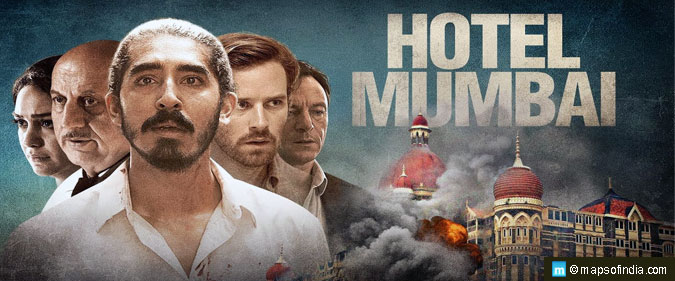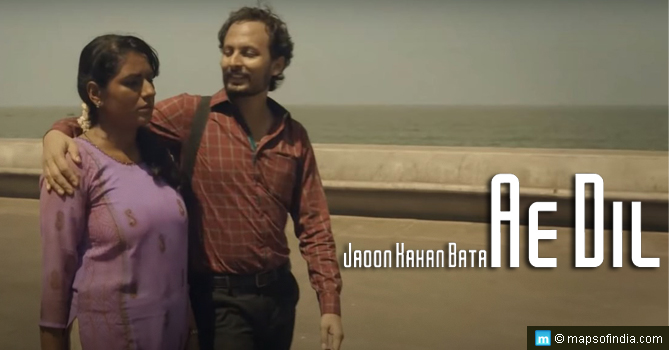
Hotel Mumbai is based on the Mumbai attack of 2008 aka 26/11 by the 10 members of Lashkar-e-Taiba which brought the city to a dead stop for four consecutive days. Some of the hot spots of Mumbai which were under attack are Chatrapati Shivaji Terminal (CST), Nariman Point, Leopold Cafe and Hotel Taj Palace.
Directed by- Anthony Maras
Produced by- Basil Iwanyk, Gary Hamilton, Andrew Oglivie, Jomon Thomas, Mike Gabrawy, Julir Ryan, Brian Hayes
Starring- Dev Patel, Armie Hammer, Anupam Kher
Plot
Arjun played by Dev Patel is a young waiter at the Taj Palace. Like a usual day, he leaves for work wearing wrong shoes, leaving his daughter to his wife, but little did he know that what seems like an ordinary day is going to be filled with the hue and cry of a city turned upside down.
The story of Hotel Mumbai focuses on the inside unrest of the guests and staff of Taj Palace during the attack.
Analysis
There are several documentaries and books on this terror strike, and most of the documentaries have shown the complete action plan and execution of the 10 terrorists who entered the city on an inflatable boat via sea route from Pakistan. These works also narrate how the terror squad conducted the rescue operation. One such documentary is Ram Gopal Varma’s ‘The Attacks of 26/11’ which is a complete non-fiction account of the event that took place on November 26, 2008 – depicting how terror struck the different spots of Mumbai starting from Leopold Cafe to Nariman House. How, Hotel Mumbai is different is it outlines the unrest which was inside the Taj during the attack by taking creative liberties – which means the story is not completely factual and cannot be relied for precision.
Now, why in particular is the Taj the focus of writer-director Anthony Maras, is maybe because the iconic hotel can fit in the western characters and he can reach a global audience with more relevance.
The story runs in a linear narration, but Maras keeps switching from the grandeur and elegance inside The Taj to the gruesome images of the terrorists’ work. He also narrates what was already eventuated outside of the Taj in first half-an hour – such as when the terrorists were gunning down people at CST and Leoplod, the Taj was busy checking temperature of bath water for the guests and serving fine wines from Bordeaux – to set a premise for what is to materialize inside the palace.
When finally, the group of four terrorists enters the Taj, in just about few minutes they start shooting with their AK 47 and throw grenades around inside the hotel. It is so unfortunate that whosoever came their way, they did not think twice before shooting them down as they are told “… ye sab kafir hain, inme rehmat mat karna”.
What is saddening is that these terrorists were hardly in their 20s and they were brainwashed completely in the name of Jihad. Their innocence can be sensed in how they get amused by the beauty of the Taj “… kabhi itni sundar jagah dekhi hain” and the way they gulp down pizzas because they have never fancied having one.
In one such scene, the mastermind who was constantly connected with the terrorists instructed them on the phone to check a woman’s bra to find her identity of whether she’s American or Russian, the young boy refuses to do so because that’s against his religion.
Religion is another subject which is used by Maras in the film time and again – which has become prototypical in films about terrorism. In one of the scenes, when the young hijacker held a gun on a woman’s head, she starts reciting la-ilaha- il-lal-lah wah-I-lahu akbar from the Quran, and the young assassin is unable to press the trigger button. The use of religion did not stop here. It went on to a Sardar’s Pagdi when Arjun played by Dev Patel removed his turban to tie it around a woman who was shot in her chest. There is also a monologue about the importance of a Turban to a Sardar when a foreigner was afraid by the look of it and is asked by the manager to move out, during the attack – honestly, it was unnecessary. And not to disregard the islamophobia amongst people which transpires prominently during such attacks.
The film indeed slows down in the second half but I think that was purposeful to show the actual stagnancy in the rescue operations because not to forget, the special squad was coming all the way from Delhi which took them seventy hours to reach Mumbai – the place of attack. As a result, the attack lasted for four days (November 26 to November 29). There are several such blunders that took place to counter that attack but there could be a separate film on that altogether.
The main characters in the film, Arjun and Hemant Oberoi played by Anupam Kher, have done a tremendous job. Kher knows his craft well but Patel who is actually a diaspora actor ace his role by playing a lower class man from Dharavi but has enough heart to stick to the philosophy “guest is God” in an unfortunate event like that.
The journey of Patel’s entry to the Taj in the day of the attack and the way his duty ended after four days of the attack vividly describes the mindset of the people who were rescued that they had no hope of ever coming out of it ever.
The entire film is extremely disturbing to sit through since it keeps you on the edge because the attacks are unpredictable. The subject of the film is such that it doesn’t give you the scope to judge it to be a good or a bad film. The film is not presented seeped in the accentuated sense of patriotism or dramatized; hence it manages to keep the plot real.
The research and the effort put into the film, deserves a watch.




